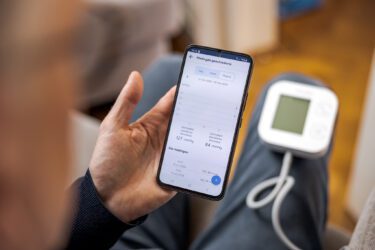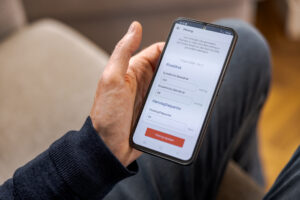Patients at the Heart Center of Amsterdam UMC can now use HartWacht as an addition to their care. HartWacht was developed in 2016 by Heart for Health, commissioned by Cardiologie Centra Nederland. With a blood pressure monitor, a small ECG device – about the size of a granola bar – and a mobile app, patients can measure their blood pressure and heart rate at home and have it monitored remotely.
This means that patients no longer need to visit their cardiologist as often, and doctors can monitor their condition daily. For physicians, this results in more accurate measurements and allows them to intervene more quickly when necessary.
Michiel Winter, cardiologist at Amsterdam UMC and Cardiologie Centra Nederland, co-leads the introduction of HartWacht within the hospital: “At CCN, we’ve already been using HartWacht to track data from more than 3,000 patients. Since implementing HartWacht, we’ve seen a decrease in ambulance calls for these patients. And because we can remotely monitor the patient’s condition, we can immediately reassure, advise, or intervene when needed. Our analyses show fewer visits to the emergency department, patients using HartWacht visit the outpatient clinic less often, and they require fewer hospital stays.”
Working Smarter
Amsterdam UMC is the first academic hospital to implement this program, which makes remote ECG testing possible, among other features. HartWacht is suitable for patients with high blood pressure, arrhythmias, or heart failure. The app enables cardiologists to work smarter. Jasper Selder, cardiologist and biomedical engineer at Amsterdam UMC and co-leader of this project, explains: “It relieves us because all the normal health measurements are filtered out. These are often the bulk of all the measurements.”
All measurements from patients participating in the HartWacht program are analyzed by the HartWacht team in Dokkum, which assesses the data. Any abnormal readings are shared with the patient’s cardiologist. Selder explains: “Instead of a cardiologist having to review dozens of heart rate and blood pressure readings during often busy outpatient visits, we now receive an immediate alert if any of those measurements fall outside the expected range. This means there’s more time for the cardiologist to focus on patient care. Abnormalities are also detected sooner, not just during regular check-ups. Based on the identified anomaly, we as healthcare providers can immediately decide if action is needed, such as adjusting medication or scheduling an additional check-up.”
Reassuring
Winter’s experience at CCN is that home monitoring also provides peace of mind for patients who often deal with a lifelong heart condition: “For patients, it’s very reassuring as they receive immediate feedback in the app after each measurement. It also helps to keep healthcare accessible and affordable. And because care is no longer bound by time and place, we as doctors can help patients much more effectively and in a timely manner. This leads to higher patient satisfaction and less unnecessary healthcare.

